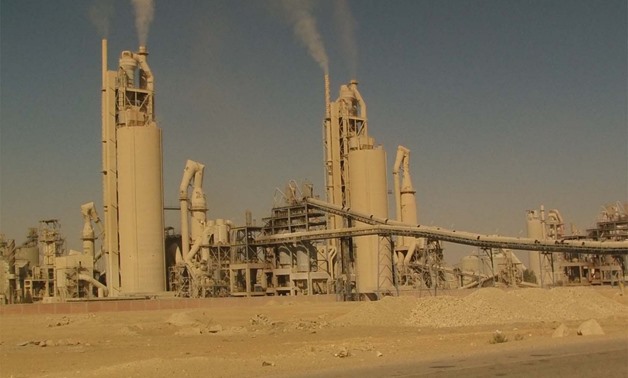
Sinai Cement Factory in Egypt
CAIRO – 1 March 2019: The Cement Industry in Egypt is one of the oldest industries, where the first cement plant was constructed in 1911, to be followed in 1927 by Egypt launching joint stock cement companies. Later, a large number of cement companies were launched and owned by the state, until the beginning of 1998, which was the start of the Private Sector Investments in the Cement Industry. At the moment there are 19 operating cement companies with 42 producing lines, which are geographically diversified in location across Egypt. Out of the 42 lines, 18 are owned by the private sector, and one by the state, with foreign investors owning 52% of the Industry. The overall producing capacity is 83.5 metric ton (M/T).
In a developing, highly populated country like Egypt, the construction & construction material industry accounts for a large share of the Egyptian Economy, estimated to be 5.9% of the overall economy. The cement industry accounts for 1% of the Egyptian GDP, and almost 10% of the Egyptian manufacturing GDP. The industry directly employees around 50,000 employees, while 200,000 are indirectly employed.
In 2014, the General Organization for Standardization and Quality has issued a set of new standards related to the use of coal as one of the main alternative sources of energy in cement factories, which included the use of coal only for the cement industry. The use of coal and alternative energy has become an urgent necessity in the cement sector, especially considering the energy crisis that Egypt has gone through between 2011 & 2013, and rising fuel and energy prices.
The cement producers, and the state regulations, ensure that all coal transportation, loading, unloading, handling and storage operations are carried out in accordance with international standards and standards of health, safety and safety through: First, the storage of coal in the operating area is in the quantities required for operation for a period not exceeding 15 days for optimal preservation of the environment. Second, Storage is carried out in closed spaces within semi-spherical or hangar storage and good ventilation is maintained to reduce the concentrations of any emitted gases such as methane. Third, coal milling operations s as a primary source of energy in cement manufacturing operations, coal milling and segregation operations are carried out in closed areas with the application of all measures that reduce air pollution. Fourth, the Storage of coal is in silos and installation of carbon monoxide monitoring devices inside the silo to ensure that these processes conform to international standards. Fifth, feeding the furnaces with ground coal is carried out using air transport inside pipelines. Burning systems within ovens is modified to deal with solid fuel.
Cement producers in Egypt has high respect to the Environment, They use alternative fuel in their energy mix according to their technological ability. The kind of waste used are agricultural waste (Aw) is more than 11 million tons per year, waste water drainage (DSS) exceeds 1.3 million tons per year, waste tires (TDF) exceeding 150 thousand tons per year. This is also simultaneously contributing to the solution of society’s problems concerning waste management. Useless materials, which are being used in the cement industry either as alternative fuels or as raw materials, if not used in the industry would otherwise end up in a landfill and would pollute the environment due to their uncontrollable disposal. RDFs are estimated at about 5 million tons per year. EBRD has been working with the Egyptian government and the cement producers in managing the Carbon Foot Print through Financial & Technical Support.
The Cement Producers in Egypt works within the regulations and legislation supporting the health and safety of their employees. Best practices, operations and facility guidelines are continuously shared and exposed between cement producers and reported to the government and other stakeholders. Safe working environment to the cement labour is guaranteed, as well as maintaining a healthy atmosphere to the neighbourhood of the cement plants.
The Egyptian cement producers in Egypt exert dedicated efforts in Corporate Social Responsibility. There are efforts excreted to coordinate the efforts of the producers and to engage in joint CSR initiatives, to achieve best results and reach the largest number of beneficiaries. Examples of CSR efforts by Cement Producers in Egypt are engaging in a wide range of sustainable activity in supporting and empowering the local communities. Producers have taken various initiatives to address their surroundings’ needs on several fronts that include environmental protection, education, capacity building and health.
In addition to this, they also donated funds to various activities and organizations working on sustainable development, as well as developed projects or programs to support underprivileged communities. Among activities supported by the cement producers in Egypt are, waste recycling which protect the environment and create job opportunities for local communities. In addition to engaging with underprivileged communities, supporting education by offering internships to students in the field, and supporting vocational schools in the producers’ neighbourhoods. The cement producers are also dedicated to capacity building of their own employees through, improving employees’ potentials, and enriching their experiences through training.
The Cement Association of the Egyptian Federation of Industries, which I am honoured to be its Executive Director, works on supporting the development of the Egyptian cement and cement-related industries. In addition to supporting the members’ interests before the industry's stakeholders, including: the governmental, non-governmental and legislative authorities, and the local and international organizations. It works on providing the best competitive environment for all companies working in the t industry in order to maintain a fair competitive environment for manufacturing cement, clinker and cementitious products as compared to other building materials and to other countries in compliance with the Egyptian Law of Protection of Competition and Prohibition of Monopolistic Practices.
By Dr. Noha Bakr
The Executive Director of the Cement Association of the Egyptian Federation of Industries

Comments
Leave a Comment